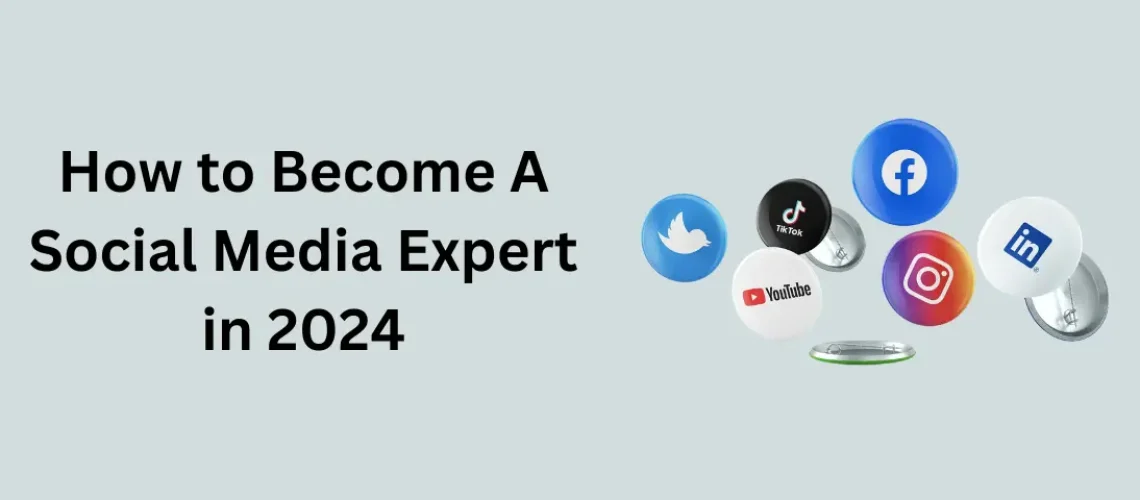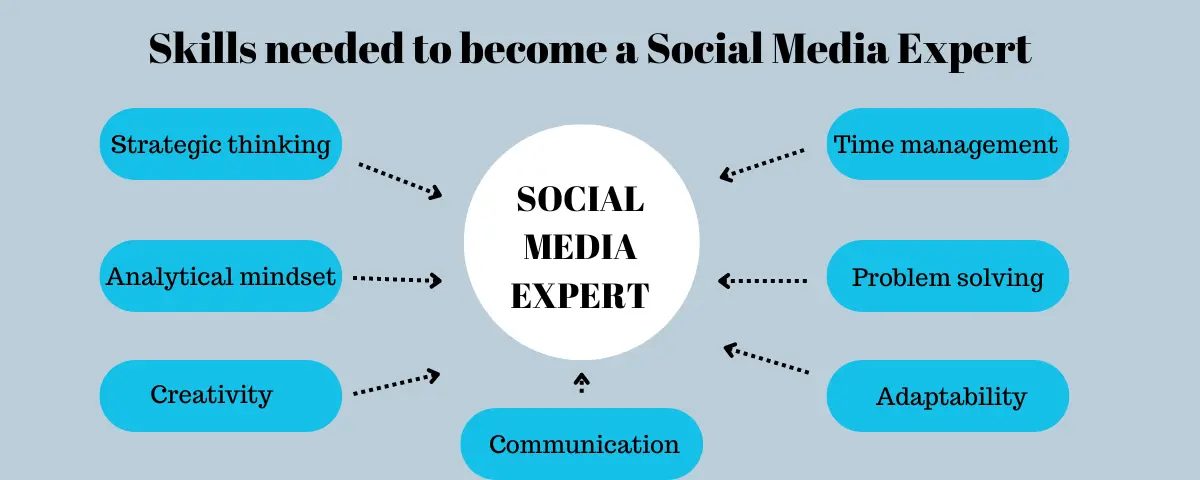In 2024, social media is super important for businesses to connect with their target customers and grow their brands. This has led to a big demand for social media experts who know how to handle the changing world of marketing and advertising online.
Whether you’re starting a career in social media or just want to get better at it, becoming a social media expert can bring you lots of opportunities in marketing and advertising.
In this article, we will be providing a guide on how you can become a social media expert and tips on how you can achieve your goals.
We’ll cover things like building a strong personal brand, creating interesting content, and understanding data. By the end of this post, you’ll have a good idea of what it takes to do well in social media and be on your way to becoming an expert yourself.
So lets get started
Who is a Social Media Expert

A social media expert is a professional with deep knowledge and expertise in using social media platforms to promote brands, engage audiences, and drive business growth. They are knowledgeable in best practices, strategies, and tools for utilizing social media platforms for marketing and communication purposes and understand the fundamentals of various social media platforms.
Get 50% Discount to Master ALL Aspects of Digital Marketing That Can Earn You $2,500 - $5,000 a month (Even if you are a complete beginner!)
Our students that intentionally implement what they learn from our digital marketing course make back the entire course fee within a single month or more after completing our course because our course gives them many income generating options with unlimited earning potential with no age or location barrier. The best part is no technical skills are required.
An opportunity to change your lifestyle and make money working from anywhere in the world. The results our students get from our digital marketing course prove this could be applied to any market or country and that it is designed for any skill level and work background.
*By signing up, you agree to our privacy policy and terms of service.
Social media experts excel at creating engaging content, overseeing online communities, and analyzing data and insights. They are adept at developing compelling social media campaigns, enhancing brand reputations, and fostering meaningful interactions with the target audience.
What Does a Social Media Specialist Do?
A social media specialist is responsible for
- Content creation and curation: creating engaging content, sourcing relevant content and developing creative ideas that engage followers on multiple social media channels
- Social channel management: managing the company’s presence on various social networks, such as Facebook, Instagram, Twitter, and LinkedIn
- Community management: responding to comments from followers or customers on owned channels to build relationships and foster engagement
- Monitoring and analytics: tracking conversations related to the brand on social media sites to gain insights into customer attitudes and preferences
- Campaign planning and execution: devising campaigns that promote product launches or seasonal sales events on social platforms; playing a pivotal role in developing social media strategies for growth
- Analytics reporting: collating data points from all sources—including web traffic referred from social sites—then producing regular reports detailing successes and areas for improvement
Types of Social Media Platforms an Expert Can Manage

Some of the popular social media platforms that a social media expert can manage include:
1. Facebook
This is the largest social media platform, with over 2.8 billion monthly active users. It offers businesses a massive audience to connect with and tailor their advertising campaigns to specific demographics.
It has sponsored posts, and targeted ads, which businesses can use Facebook to reach their target audience. Facebook’s analytics tools provide valuable insights into campaign performance, allowing businesses to optimize their strategies.
2. Instagram
One of the main characteristics of Instagram is its visually appealing interface and emphasis on images and videos. It is a social media platform that is mostly used by brands looking to target younger demographics.
With features like Stories, Reels, Subscription pages and Channels, brands and individuals have a multitude of creative options to explore and connect with their audience on a more personal level. Instagram’s interactive nature and visual storytelling capabilities make it an ideal platform for brands to not only showcase their products and services but also to build a strong and authentic connection with their followers.
3. Twitter/X
With a character limit of 280 characters per tweet for a free plan and unlimited for a paid plan, X is known for its real-time updates, breaking news, and concise short-form content. It allows businesses to share quick updates, engage in conversations, and stay connected with their audience in real time by discussing trending topics via viral hashtags.
X provides a space for brands to join relevant conversations, host a space, showcase their personalities, and build a strong online presence using features like retweets, likes, and replies. Twitter increases engagement and interaction, allowing brands to connect with their audience on a personal level.
4. LinkedIn
LinkedIn is a professional networking platform that connects professionals and businesses It focuses on business-related content and connections. It provides a space for individuals to showcase their professional achievements and network with industry peers.
From job postings to industry insights, LinkedIn serves as a hub for career development, business opportunities, and thought leadership. With features like LinkedIn Groups, articles and newsletters, and Company Pages, users can engage in meaningful discussions, share valuable content, and establish themselves as industry experts.
5. YouTube
With over 2.7 billion monthly active users, YouTube is the world’s largest video-sharing platform. YouTube offers unparalleled reach and visibility for businesses looking to showcase their products or services in a dynamic and interactive format. Businesses can engage in product tutorials and behind-the-scenes videos, brand storytelling, and influencer collaborations to engage with their target audience on a deeper level.
YouTube’s robust analytics tools provide valuable insights into viewer behavior, allowing brands to optimize their content strategy for maximum impact and engagement. Today, where video content is especially king, YouTube presents a prime opportunity for brands to showcase their creativity, build brand awareness, and foster a loyal community of followers.
6. Pinterest
Pinterest is a great place for fashion, lifestyle, and design brands to share beautiful photos and pictures. It’s all about being creative and using images. Pinterest gives people a special place to find and save ideas for things like fashion, home decor, DIY crafts, and travel spots.
Brands that want to show off their products or services in a fun, visual way can use Pinterest to reach their target customers and get people to visit their websites.
How to Become a Social Media Expert

1. Gain a deep understanding of social media platforms
You can’t become an expert at something if you don’t understand it. You need to take your time to understand the unique features, characteristics, and target audiences of each of the platforms like Twitter, LinkedIn, YouTube, and Pinterest.
Get familiar with social media tools, and continue enhancing your social media management skills. Finally, stay updated with updates in the social media space and adjust accordingly so you can remain relevant.
2. Develop strong communication and writing skills
As a social media expert, your ability to communicate effectively is crucial. You need to be able to express your ideas clearly and persuasively, both in writing and verbally. Strong writing skills are also important, as you’ll create content for various social media platforms.
Practice writing engaging, attention-grabbing posts that convey your message concisely. You should learn to communicate with the tone and style that suit different platforms and target audiences.
When you develop a keen eye for detail, it ensures your content is free of errors and typos. Finally, effective communication also involves active listening and the ability to understand and respond to your audience’s needs and concerns.
3. Build a personal brand
To position yourself as an authority in the social media industry, it’s important to practice what you preach. This goes beyond simply sharing content; it involves strategically providing valuable insights, actively engaging with your community, and showcasing your expertise through thought leadership.
Offering valuable insights goes beyond surface-level information, delivering actionable content that broadens your audience’s experience by sharing industry trends, expert advice, or practical tips. You can do this by responding to comments, participating in discussions, and attentively listening to feedback.
Over time, your personal brand will attract a following of people who appreciate your content and see you as an authority in your field. This can lead to new opportunities, such as speaking engagements, guest blogging, or even job offers.
4. Gain practical experience
While education and certifications are valuable, practical experience is the key to becoming a true social media marketer. Running successful campaigns for real clients or brands is the best way to develop your skills and build a portfolio.
Look for entry-level social media roles, internships, or freelance opportunities to get your foot in the door. Work with a variety of clients across different industries to gain diverse experience. Experiment with different tactics, measure results and learn from your successes and failures.
As you gain more experience, take on increasingly complex projects and leadership roles. Collaborate with other marketing professionals to learn from their expertise. Continuously seek out new challenges and opportunities to grow your skills.
5. Focus on soft skills
Experts in social media require not only technical skills but also soft skills, some of which include interpersonal, collaborative, problem-solving, critical thinking, time management, leadership, and creativity. Proficiency in interpersonal skills is important for managing human relationships. It helps to improve one’s ability to work with others and can have a positive impact on your business.
6. Create a portfolio to present your work
Building a portfolio for showcasing your skills and experience as a social media expert is vital. Gather examples of your previous work, such as successful campaigns, content creation, and community engagement that you have done for clients.
Organize your portfolio in a visually appealing and easy-to-navigate format. Include metrics and results to demonstrate the impact of your work. You should also highlight your best projects and explain the strategies behind them.
A strong portfolio not only demonstrates your capabilities but also helps potential clients and employers understand the value you can bring to their social media efforts.
7. Stay updated with industry trends
Stay informed and up-to-date on the latest trends, algorithm updates, and best practices in your niche and industry. One of the most effective ways to do this is by following industry influencers who provide valuable insights and expert advice on navigating social media.
Additionally, attending webinars or workshops dedicated to social media marketing can offer in-depth knowledge and practical strategies for optimizing your brand’s online presence.
Skills Needed to Become a Social Media Expert
1. Strategic thinking
Strategic thinking in social media also involves setting clear objectives, defining key performance indicators (KPIs), and continuously monitoring and analyzing data. A social media expert can optimize campaigns for maximum impact and ensure that every post, tweet, or ad contributes to the overall business objectives.
2. Creativity
Creativity is a vital skill for a social media expert. It involves thinking outside the box to create engaging and original content that captures the audience’s attention. From crafting compelling posts to designing eye-catching visuals, creativity plays a key role in developing successful social media campaigns.
To enhance your creativity, experiment with different types of content, such as videos, infographics, and interactive posts. When you set yourself apart, it can help you deliver fresh, engaging content that resonates with your audience.
3. Analytical mindset
It involves the ability to not only collect and analyze data but also derive insights that can optimize social media campaigns. When you have an analytical mindset allows you to study metrics such as engagement rates, click-through rates, conversion rates, and audience demographics.
A skilled analyst can uncover patterns, trends, and opportunities that would lead to strategic decision-making that would improve the content strategy. As a social media expert, thinking analytically also allows you to focus not just on the what, but also on the why.
4. Communication skills
A good social media expert must be able to communicate their messages effectively and engage with the audience. With good communication skills, you can engage in conversations, respond to queries and drive conversions in the long run.
It also helps to build relationships and trust with your audience, which would play a role in ensuring their loyalty towards your brand.
5. Adaptability
There’s this saying that if you don’t adapt, you will go extinct. This is also true, as a social media expert. If you don’t try to keep up with the latest trends and updates in the social media industry, you will become outdated.
Adaptability involves not only a willingness but also an enthusiasm to stay updated on the latest trends, algorithm modifications, and platform updates.
6. Problem-solving
A skilled problem-solver can analyze the root causes of any issues, brainstorm creative solutions, and implement effective strategies to address them. The problem could range from devising new content strategies to recapture the interest of your audience, resolving customer complaints with empathy and professionalism, or troubleshooting technical issues that impact campaign performance.
By having a problem-solver mindset, a social media expert can identify challenges or issues and also come up with innovative solutions to overcome them.
7. Time management
This skill requires organization, prioritization, and time management to ensure that all content is published, engagement is monitored, and campaigns are optimized promptly.
Time management involves scheduling posts, responding to comments and messages, analyzing performance metrics, and adjusting strategies as needed to meet the goals of the brand or business. This helps to increase productivity and effectiveness of the job.
Courses to Become a Social Media Expert
To get practical knowledge about how to successfully become a social media expert, then check out our courses at Digital Marketing Skill Institute, where we have a carefully designed and easy course to guide you through this journey. Here, you will learn how to use various tools to manage, measure, and optimize your social media channels and the graphic design skills that you will need to design awesome graphics for social media posts, banners, logos, flyers, brochures, and so on.
Conclusion
Becoming a social media expert is beyond the steps listed above. It requires dedication to continuously learning, even as new trends resurface. It is always important to start by exploring the different social media platforms to understand how unique each of them is.
Communication skills are also useful in conveying the brand’s message. Getting hands-on experience also aids in becoming a social media expert. It allows you to work alongside seasoned professionals, and learn firsthand the ins and outs of managing social media platforms.
FAQS
What is a social media specialist’s job?
A Social media specialist is not just a mere content creator; they are the ones who meticulously craft strategies to captivate and engage with the online audience. Their role involves a delicate balance of creativity and data-driven decision-making, where every post, comment, and interaction is strategically planned to maximize impact and drive results.
Beyond content creation, social media specialists guard a brand’s reputation, constantly monitoring trends, sentiments, and conversations to ensure that the brand’s voice remains authentic and relevant. They are the bridge that connects the brand with its audience, fostering relationships, building trust, and driving meaningful interactions that translate into tangible business outcomes.
Why use Social Media for your business?
Social media offers businesses numerous benefits, including increased brand visibility, direct communication with customers, targeted advertising, brand storytelling, and a competitive advantage. Platforms like Facebook, Instagram, Twitter, and LinkedIn allow businesses to tailor content to different demographics, fostering trust and loyalty.
Direct communication with customers enhances transparency and trust, while targeted advertising optimizes marketing efforts. Social media also allows businesses to share their values, mission, and unique selling propositions, creating emotional connections with the audience.
Mistakes a social media expert should avoid
1. Ignoring audience research: Understanding your target audience’s demographics and behaviours is crucial for content creation and engagement.
2. Lack of consistency: Posting schedules should be consistent to maintain audience interest.
3. Overlooking engagement: Responding to comments and messages can damage your brand reputation.
4. Neglecting analytics: Regularly monitor metrics to optimize your strategy.
5. Relying too much on automation: Balance automation with genuine interaction for authenticity.
6. Focusing solely on promotion: Provide value through educational, entertaining, and informative content.
7. Ignoring platform-specific best practices: Staying updated on industry trends and experimenting with different content formats can help.
8. Lacking authenticity: Show the human side of your brand and avoid polished messaging.
More Resource
10 Social Media Mistakes You Need to Know About
Social media marketing: What it is and how to build your strategy
8 Ways Nigerian Businesses Use Social Media To Grow Their Business
15 Social Media Marketing Tools For Nigerian Online Marketers



